The smartphone has become an integral part of our lives in Germany and can be used in many situations like paying the bills, investing, buying train tickets, accessing your insurance app or even shopping for groceries or tickets to cultural events. Every day we spend many hours with this compact device. Whether as a camera, as a notebook, or for playing series: the mobile phone is a faithful companion.
But despite all these useful functionalities, the original purpose is still in the foreground: telephony and mobile accessibility.
Consequently, everyone with such a mobile device also has a SIM card with which they receive both incoming and outgoing messages and telephone calls.
Of course, like almost everything in life, this also has its costs. As smart consumers, we are therefore also looking for the best price-performance ratio in this area. This article deals with which mobile phone contract in Germany is the best for you.
Before we turn to the best mobile phone contract, let's first consider why a contract makes sense at all.
The only required selection is whether to sign up for a prepaid tariff or a mobile phone contract.
If you don't want to face an unexpectedly high mobile phone bill at the end of the month and only want to make a limited amount of credit available for telephony, a prepaid tariff is more suitable for you. This is useful for children, for example, who should be reachable without breaking the financial framework.
At the same time, you remain largely flexible with prepaid tariffs: If you no longer need the prepaid card, you are not tied to contract terms and can have the credit paid out - so that the prepaid card is considered canceled.
In contrast to fixed-term contracts, usually, there is no basic fee for prepaid models, which is why they are mostly cheaper.
So if it's just a matter of saving as much as possible, you naturally tend to go with the prepaid model first. However, since many discounters now also offer very lucrative mobile phone tariffs, it is worth comparing prices in advance.
But be also cautious with prepaid tariffs: If the credit is used up, the functionalities are correspondingly limited until the next time you refill your credit balance.
A fixed contract, on the other hand, stands out with its convenience, since you only have to conclude it once without being limited in your credit and always checking the status of it.
However, this also means that you always pay the full price, regardless of your calling and Internet surfing behavior. Depending on the situation, this can have both positive and negative effects.
But a look at current tariffs shows that the offers often include top services: discounted smartphones, high-speed Internet, or high data volume for Internet surfing. So you will be able to find a satisfactory offer.
In general, no concrete conclusion can be drawn between prepaid tariffs and mobile phone contracts, since it behaves differently from situation to situation and between different preferences. More important is the comparison between the individual tariffs and the mobile phone providers.
A contract means commitment. Commitment means longer terms and therefore a risk if you make the wrong decision.
Therefore, when concluding the mobile phone contract, it is important to start directly at the root – the mobile phone provider.
As with any service provider, you should consider the following factors:
But probably the most relevant factor would be the mobile phone network, as this determines your reachability.

There are three relevant mobile phone networks in Germany. To be able to find a suitable mobile network provider for you, we have selected some favorites in the best mobile network as of now:
| Vodafone | Telekom | O2 | |
|---|---|---|---|
| Max. Down & Upload Speed | 500 / 100 Mbit/s | 300 / 50 Mbit/s | 500 / 50 Mbit/s |
| Max. Data Volume | Unlimited | Unlimited | Unlimited |
| Lowest monthly price | €29,99 | €39,95 | €19,99 |
| Contract Duration | 2 Years | 2 Years | 2 Years |
| 5G available | Yes | Yes | Yes |
| Network Provider | Vodafone | Telekom | Telefónica O2 |
| Roaming in EU | Yes | Yes | Yes |
| Roaming in UK | Yes | Yes | No |
| Roaming in Switzerland | No | Yes | No |
Deutsche Telekom's network is the best developed and fastest. Especially in rural areas, Telekom stands out from its competitors with its extensive accessibility and is therefore rightly selected as test winner. At the same time, Telekom is working on further expanding the 5G network nationwide - and all this from completely renewable energies.
Telekom's D1 network includes, for example, Telekom itself, Congstar, Klarmobil, and other providers, which, however, are mainly implemented by the first-mentioned providers.
While Telekom stands out with its large availability of LTE + 5G availability and with an extensive selection of tariffs, the monthly prices are increased accordingly.
As a subsidiary of Telekom, on the other hand, Congstar offers high-performance network quality at comparatively lower tariffs. However, the maximum high-speed option from Congstar is only 50 Mbit/s, which is quite low compared to the possible options from Telekom. Therefore, Congstar might seem a little slower.
Vodafone is the second largest network in the German market and is known as the D2 network. It is characterized in particular by the broad supply of 2G and LTE networks, as this has been expanded by Vodafone since 2010.
Since Vodafone also enables trouble-free phone calls in this way, there is no serious difference to the Telekom network.
Last but not least, Telefónica offers the cheapest cell phone network and is also called the "E-Netz" because it is a combination of the networks from E-Plus and O2.
While this mobile network is mostly cheaper, there is a possibility that rural areas will not have as good coverage as the other providers. In most cities, however, the Telefónica network can already keep up. It is therefore important to use the network coverage map to check in advance whether your place of residence falls within the coverage areas. If this is the case, Telefónica is in no way inferior to the other two providers.
All cell phone providers in Germany use one of these networks. 1&1 is currently still using the Vodafone network but has already announced the future construction of its own 5G network.
If you have now decided on a suitable mobile phone provider in Germany, you are on the right track. Now it's time to find the right cell phone contract with your favorite cell phone provider.
In this section there are also key factors that you should pay attention to when making your decision in order not to fall into a cost trap:
It is essential to know your own needs and requirements before accidentally deciding on an unsuitable plan. Therefore, first make yourself aware of what your priorities are and what your usage behavior is like.
And the fear of commitment greets you every day. A 24-month commitment isn't for everyone.
If you have decided on an unsuitable tariff or provider or find a better tariff, you are now stuck with a long-term contract for a while.
To avoid this, many prefer the option of canceling on a monthly basis. However, if you do not want to deal with the mobile phone contract question for a longer period, something long-term is the right thing to do. But stay aware of automatic contract extensions!
At this point, it is very important to know your usage behavior. If you make calls for several hours a month, you can already classify yourself as a frequent caller and should consider a flat rate.
If you would also like to stream videos on a train journey, for example, you will need an increased data volume (10GB or more). As a normal user who only wants to check something on the go from time to time or who wants to use WhatsApp, even 3GB should be enough for you.
If, for example, you want to use the mobile Internet to work on several devices, it would make sense to pay attention to the possibility of several mobile phone cards when agreeing on a tariff.
Also, watch out for international calls: This can quickly become expensive. If you travel a lot or want to make a lot of international calls, we recommend that you also pay attention to this aspect when choosing a tariff.
However, you don't have to rack your brains about this: If you later find out after booking your tariff that the booked amount is not enough for you, you have the option of adjusting the volume with most providers afterward.
Undoubtedly one of the most important aspects. No one wants to be stuck with horrendous expenses. At the same time, it is also known that when you try to save too much, you often have to make some sacrifices in other factors as well.
If you want the cheapest tariff, you may have to make extensive compromises in terms of quality, volume, and other contract conditions. But when comparing the discounter tariffs, it is possible to choose the best in terms of value for money.

Many providers lure customers with an unbeatable offer: a mobile phone tariff and the latest smartphone for just one euro. Too good to be true? Almost - it is an interesting deal to pay off a new smartphone over a longer period with small fess.
But with the surcharge for the new mobile phone, which is then included in the monthly fee, the customer usually pays more than he would have paid for the phone if he had bought it immediately from a retailer.
Therefore, it is generally recommended to purchase the tariff separately from the smartphone in order to be able to determine the costs separately and thus compare them. Don't let yourself be blinded.

Countless tariffs are being offered at this moment. All-Net flat rate, high-speed internet, and unlimited data volume are just a few of the much-demanded features.
As soon as you have determined your own needs and your requirements for a mobile phone contract, it is time to choose the right tariff for you.
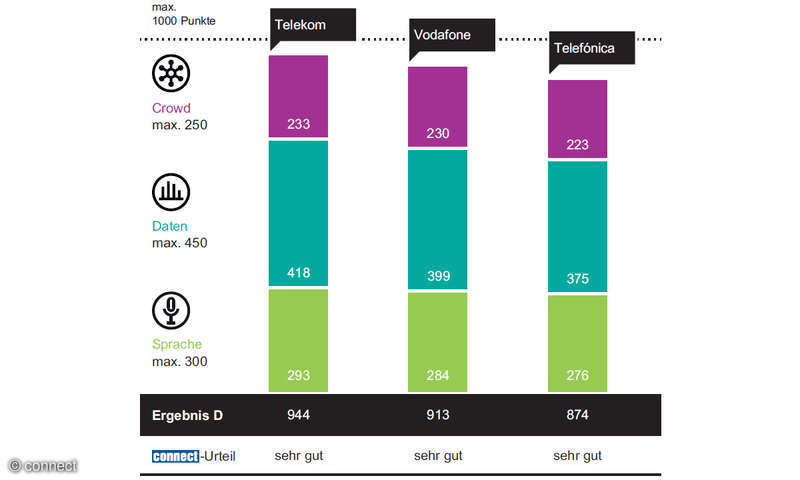
To help you, we've highlighted the best mobile rate plans for you from our perspective:
1) Do you call and text a lot? Then you should purchase a flat rate for telephony and text messages on all German networks. The Congstar Allnet Flat M tariff with a basic fee of €20 per month is particularly advantageous.
2) Are you on the go and don't want to miss the current soccer game? Then get the best LTE tariff from Deutsche Telekom with 18GB data volume and up to 300 Mbit/s. You also pay a basic fee of around €20 per month, but you are bound to a longer minimum term of 2 years.
3) If cost control is still most important to you, the Congstar prepaid tariff is suitable for only €3.26 per month. You will also receive a starting credit of €10.00, which will quickly pay off.
Don't forget: A mobile phone contract is a product. And there are discounts, promotions, and vouchers on most products.
If you are not in a hurry, you should therefore wait for the right time. Black Friday (November 25, 2022) or Cyber Monday (November 28, 2022) might surprise you with some pleasant offers.
If you don't want to wait that long, you can also check on the weekend. The best tariffs are always available at that time since the providers often set weekend promotions that expire on Mondays. In this way, providers lure customers without lowering their general price level too low.
However, you must take the time to compare the conditions in advance without making a hasty decision.
If you have now finally decided on a different tariff, it is now the time to cancel your previous contract. The mobile phone contract can usually be canceled simply by e-mail.
However, please note your notice period. Especially for mobile phone tariffs with a term of 24 months, you have to be quick before the contract is extended automatically.
Contracts without a term, on the other hand, should usually be able to be canceled within one month. In this case, you should consider in advance which tariff you want as an alternative, so that you don't end up without any telephony afterwards.
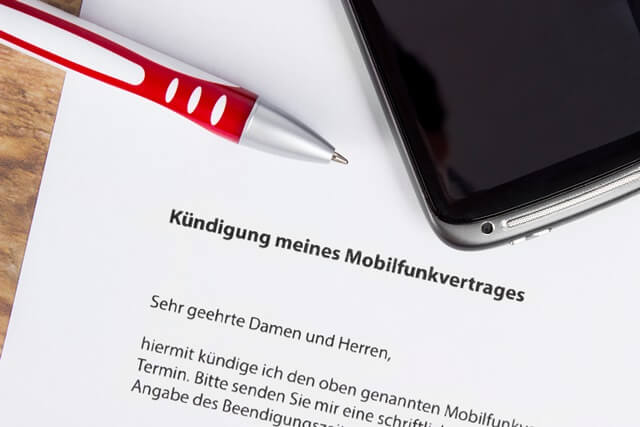
However, the game is not completely over with that, because your previous mobile phone provider naturally does not want to lose any customers.
Have you ever quit your job and your boss gave you a better offer to persuade you to stay? That's how it works here too.
If you cancel your current mobile phone tariff, your provider will actively try to keep you as a customer. This usually leads to extremely discounted mobile phone tariffs that are not offered directly.
As before, the motto now is: compare! You may now have much better terms that make you happy. Then you can save yourself further effort and confidently stay with your current provider.
But don't forget to always stay up to date and to look around for new tariffs and compare them after a certain period so that you can always save and take them with you.
The best mobile phone contract is undoubtedly the one that suits you best and meets your expectations. You should pay attention to aspects such as prepaid or contract, a mobile phone contract with or without a smartphone, the size of the data volume, the contract period, and the resulting flexibility. Of course, all these features must be evaluated from the price point of view – it doesn't always have to be the most expensive tariff.
The cell phone network also plays a major role in the choice of contract and consequently also in your availability, so the D1 network is generally recommended. If you are someone who makes a lot of calls and texts, you should opt for a flat rate.
Nevertheless, the mobile phone providers are always making new offers possible, so you should regularly look around for new, cheaper alternatives.
After canceling your original cell phone contract, your provider will want to lure you – so compare again.
And even if you have already taken out a new cell phone contract but are not completely satisfied with it: read the contract, look at the notice period and repeat the whole process of comparing.
This way you are always up to date and will get the cheapest rates!
Taxes are a big part of Germany and therefore they must be taken extremely seriously, as in most countries. For future expats or people who have already work in Germany, the topic of taxes can raise many questions. It is not uncommon for expats to find themselves facing many problems, and often it is not even possible to know where best to start.
There are many taxes in Germany. Among them are taxes on food. If you buy beer, coffee, tobacco or sparkling wine in Germany, you will have to pay different taxes. However, unlike in some other countries, these are already noted in the price itself.
This means that you do not have to add the corresponding taxes to the purchase price. Also in the area of entertainment there are some taxes you should consider. Do you have a dog or even several? Then a certain tax is due depending on the municipality. Also interesting: The breed of the dog plays a role in the tax collection in some cases.
If you belong to a church association, you pay a church tax in Germany. This applies to both Catholic and “Evangelische” church members. In addition, there are many other areas that are taxed. Racing bets and lotteries are taxed, as are casinos. The so-called amusement tax also states, for example, that admission to events must be taxed.
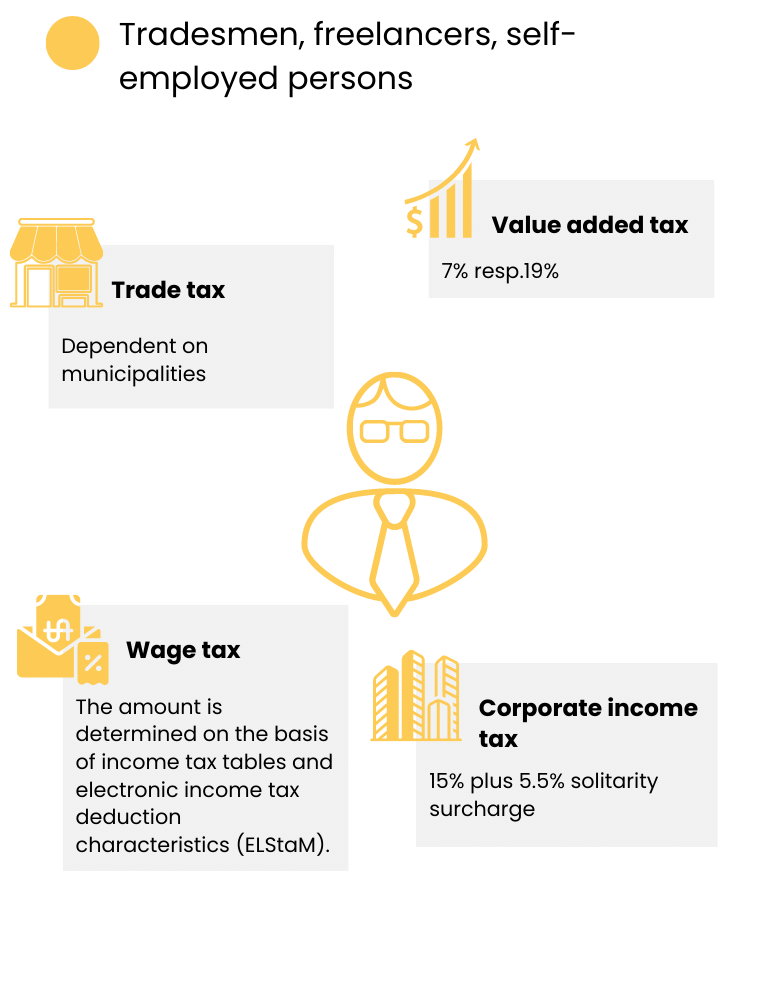
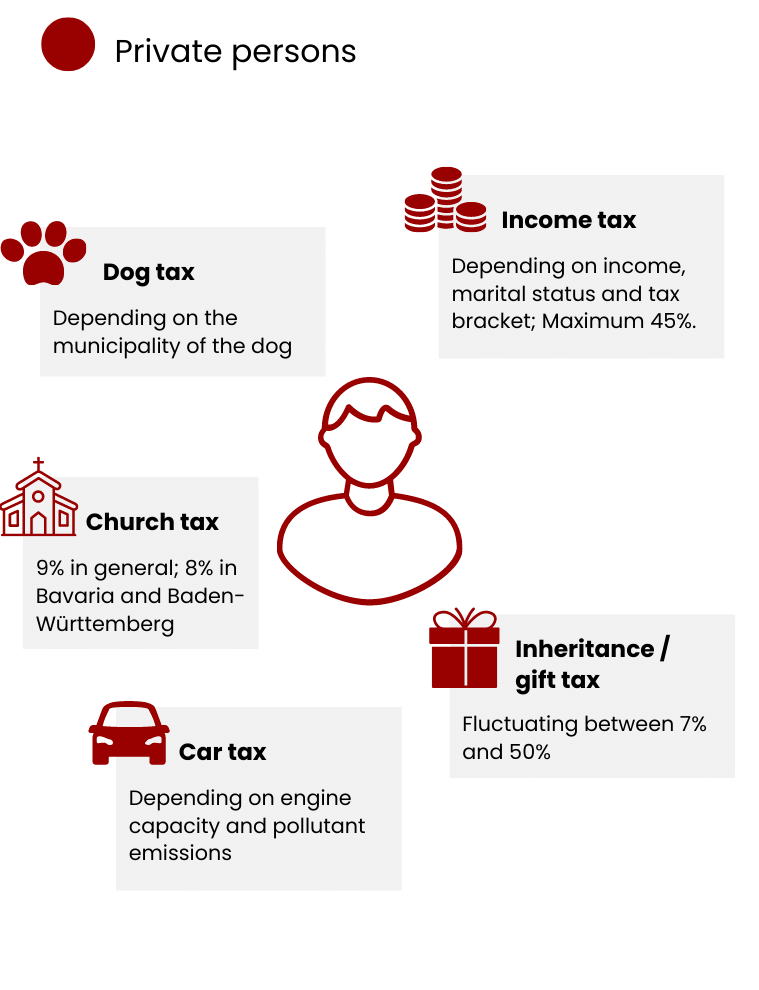
Value added tax is a tax on consumers. This is to be paid by the end consumer when purchasing products or services. Thus, as a customer, you pay the gross price when purchasing a product or service.
If you have to write an invoice for your own customers for professional reasons, you are obligated in Germany to hand over a receipt to the customer. In addition, you must keep a so-called VAT statement (Mehrwertsteuerbescheinigung). This means that for both cash payments and bank transfers, your issued invoice must show the VAT rate and tax amount in addition to the cost of the product or service.
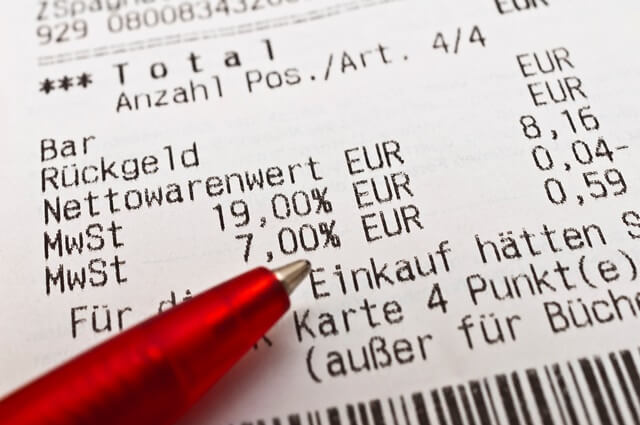
The corresponding input tax deduction creates the possibility for entrepreneurs to offset certain prepaid taxes against the respective VAT. Through this methodology, the end consumer pays the VAT and the business is not charged additionally or twice.
As a rule, the 19% tax rate applies to any sales that are subject to taxes. In Germany, goods for daily use are taxed at only 7%. This is a reduced rate of value added tax (ermäßigte Mehrwertsteuer). This applies, for example, to basic food such as bread or milk. Events in the media and art sectors are also subject to the reduced VAT rate. The same applies to public transport, such as buses and trains, and products whose sales are related to copyright law. Examples include books, films and broadcasting fees.
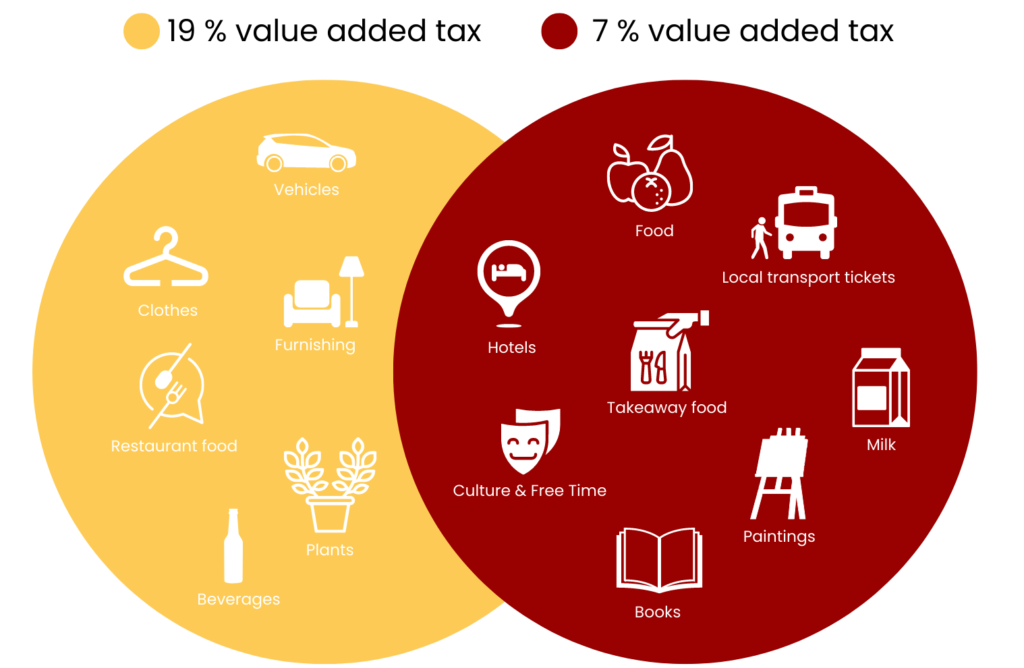
Another, quite important type of tax, is the income tax (Einkommensteuer). As the name suggests, this is the tax on your individual income, i.e. your salary. The German income tax system is progressive. A higher marginal tax rate is calculated for the higher part of the income in each case. The higher the income, the more the average tax rate approaches the marginal tax rate of 42 per cent.
If you are a classic employee, you pay a monthly income tax. This is automatically deducted from your salary. In this case, you do not have to file a typical tax return. However, there are a few exceptions. For example, if you have other sources of income in addition to your main income, such as a short-time worker. If this additional income exceeds 410€, you also have to file a tax return.
Even if you are still a trainee or student, you have to pay your taxes. The tax allowance is currently 9,744€ gross (in the tax year). If this amount is exceeded, everyone permanent employees and part-time employees, students, etc. must pay. In some cases, you may not be required to file an income tax return. However, there are a few situations in which a voluntary income tax return in Germany is appropriate.
With the help of the taxable income and the individual tax class (there are a total of six different tax classes in Germany), you can easily determine your tax burden with an online calculator. In addition, there is a so-called top tax rate (Spitzensteuersatz). This is currently at 42%. If you receive an annual income of €58,597, this top tax rate takes effect to serve as a brake on infinitely high taxes. All the money above this limit must be taxed at 42%. But watch out: In the case of married couples, twice the value of €117,194 applies as the limit.
The idea behind the progressive tax system is that low-income earners have a lower tax rate than people with high incomes.
Of course, there are quite a few more taxes to consider in Germany. For the sake of simplicity, we will summarize them compactly so that you can get a rough overview. All of the taxes listed are related to everyday activities that may affect you to a greater or lesser extent.

Inheritance and gift taxes are also of particular interest. Because as soon as you receive money (assets) as a gift, the transfer of assets that has taken place is taxed. Therefore the big house or massive inheritance can quickly become a “tax shock”.
Emigrating to Germany is only half the fun if you are without a car. Granted, in large cities with subways, buses and trams (S-Bahn), you don't necessarily need a car, yet many people in Germany choose to do so because having their own vehicle brings so much convenience.

If you have traveled or emigrated to Germany to continue your self-employment, you will of course be subject to certain taxes. Unfortunately, Germany does not make it easy for the self-employed in many areas. So if you feel overwhelmed by the information at first, you are certainly not alone.

After all, there are a number of different things you should be aware of when it comes to self-employment taxes in Germany.
It is important that you know basic information for tax contexts, otherwise it will be difficult for you to understand the tax and its composition. Ideally, you should deal with the German tax before you become self-employed, in order to prevent annoyances and avoid nasty surprises.
You need to understand that if you submit incorrect information, you can expect not only financial penalties or reminders. Your business will also attract negative attention and will probably be inspected more often or more intensively by the tax office. For clarity and security in self-employment as an expatriate in Germany, you should therefore pay close attention to taxes.
Depending on the type of self-employment, different taxes are due. In the case of a GmbH, for example, one is subject to corporate income tax. In addition, certain purchases for the business or the self-employed work can be deducted from the tax. Here, too, it can be interesting to inform yourself in advance. In any case, keep the receipts for certain purchases, such as a new laptop. In this way, you can also deduct a business meal, among other things, provided you still have the invoice.
In addition to corporate income tax, the self-employed must also pay income tax. For single people this amounts to 9,000€, for married couples it is 18,000€. If you work as a self-employed person in your trade, a trade tax is due. Freelancers do not have to pay this, but of course they are still obliged to pay income tax.
If you have emigrated and employed people, you also have to pay income tax for these employees. Especially if you are above the 9.000€ with the salary, it makes sense to get a tax consultant and/or a financial advisor for support. In some areas, they also offer help in English, if you still feel uncomfortable with the German terminology.
Since 2021, only certain groups have to pay the solidarity surcharge (Solidaritätszuschlag). The so-called Soli will thus be paid by high earners, investors (with exhausted savings allowance), limited liability companies and other corporations.
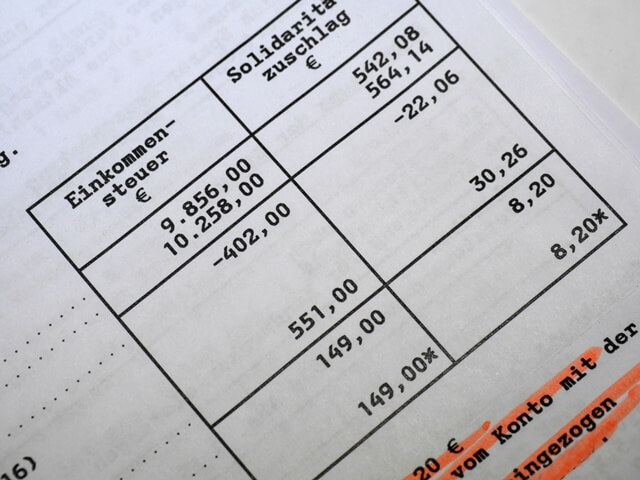
This means that about 90% of all taxpayers, i.e. a considerable part of all taxpayers, do not have to pay the Soli anymore. If you have to pay the Soli due to the above mentioned groups, it is added to the classic income, wage and capital gains taxes.
In total it is 5.5%. Your employer deducts the solidarity surcharge directly from your salary. The amount of the solidarity surcharge to be paid is stated on your income tax assessment notice.
As an expatriate in Germany who does not have a domicile or habitual residence in Germany, you are only subject to limited tax liability.
If you stay in Germany for more than six months, you become liable to pay taxes. Even if the limited tax liability sounds very positive at first, there are also some other aspects that need to be mentioned. Here it is namely so that with a limited tax liability also some advantages remain away.
For example, there is no basic tax-free amount. As a result, you have to pay taxes even on very low amounts, which quickly turns out to be not very worthwhile. There are no tax allowances for children, and you are not entitled to any relief for single parents either.
The topic of taxes in Germany may seem quite confusing at first, but if you deal with it in detail, you will quickly understand what the German bureaucracy is all about. Certain basics are important and must be adhered to. If you have any questions, you can of course always contact the relevant office (tax office - Finanzamt, etc.) yourself.